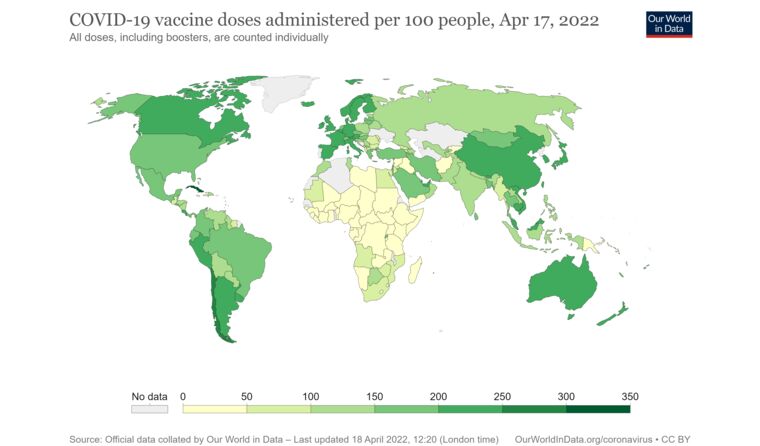News
Decline in Australia’s COVID vaccine donations as wastage soars
Untold numbers of Australian COVID-19 vaccines are ending up in the bin, when they could be going into the arms of the world’s most vulnerable.
 Australia’s overall COVID-19 vaccine wastage is now nearly 10%, having been 3.5% as recently as November 2021. (Image: AAP)
Australia’s overall COVID-19 vaccine wastage is now nearly 10%, having been 3.5% as recently as November 2021. (Image: AAP)
In January, more than seven million doses of COVID-19 vaccine were administered across Australia.
Since then, COVID vaccinations have steadily declined, to around four million in February and just over two million in March.
The rate has slowed even further in April, with the seven-day average dropping from 63,000 doses per day at the start of the month to barely 36,000 as of Monday 18 April.
But despite demand dropping significantly as Australia’s booster and childhood vaccination programs stagnate, so to has the number of COVID vaccines being sent overseas.
Between 18 November 2021 and 25 February 2022, Australia donated nearly 16.6 million doses at an average of around 5.5 million per month, or nearly 393,000 per week.
However, in the ensuing 53 days, that rate has nearly halved, with only 1.1 million doses heading overseas at an average of 157,000 per week.
Meanwhile, the number of doses being wasted appears to have soared.
Although the Department of Health (DoH) was unable to provide newsGP with its most up to date wastage statistics, it did say Australia’s total national wastage amount since the vaccine program began on the 22 February 2021 was ‘just under 10%’, which one of the ‘lowest’ among wealthy countries.
This contrasts significantly to figures sent to newsGP in November 2021, when the DoH said the rate was 3.5% at the time, suggesting a substantial increase in wasted doses in recent months.
And, given Australia has administered more than 57 million COVID vaccines to date, a wastage rate of just under 10% would suggest at least 5.5 million doses have been thrown in the bin.
In the meantime, one of Australia’s closest neighbours – Papua New Guinea – has still only ‘fully vaccinated’ 2.9% of its population.
 Global COVID-19 vaccine doses administered per 100 people. (Image: OurWorldInData)
Global COVID-19 vaccine doses administered per 100 people. (Image: OurWorldInData)
This disparity in vaccine equity is the main reason why experts such as Professor Robert Booy say the pandemic will continue to plague developed and developing countries around the world, despite high domestic vaccination rates.
‘No one is safe until we are all safe from COVID,’ he told newsGP.
Professor Booy’s concerns are echoed by the college, with the RACGP urging the Federal Government to step up its COVID-19 vaccine donation efforts.
‘If we only concern ourselves with boosting vaccination figures in the world’s wealthy nations, the COVID-19 pandemic will strike again and again,’ RACGP President Adjunct Professor Karen Price said.
‘The virus will continue circulating, mutating, and potentially becoming even more dangerous.’
The situation has deteriorated to such an extent that the college is now calling on the Government to ‘do everything possible to donate excess doses overseas’.
‘The entire developed world, including Australia, needs to wake up and do much more to boost vaccination efforts in the developing world,’ Professor Price said.
‘This includes ensuring that excess stock isn’t simply thrown in the bin.’
Professor Booy agrees and says more needs to be done than just giving away unwanted vaccines that are close to expiry.
‘We shouldn’t just be donating vaccines that are expiring in one or two months,’ he said.
‘They need to have three, preferably six, months of shelf-life and they should be high quality, safe and effective vaccines that are registered with the TGA [Therapeutic Goods Administration].’
But donation is only the first step. The next is getting vaccines into people’s arms.
‘We need to provide more than just vaccines, we need to provide expertise,’ Professor Booy said.
‘This is particularly a problem in Papua New Guinea, where the combination of suspicion and superstition about COVID vaccines has led to very poor uptake.
‘We need to be helping our neighbours not just with vaccine delivery but with education and understanding.’
Earlier this year, the RACGP was one of 70 health and business groups that called out the Australian Government for donating less money to COVAX, a global initiative to support equitable access to vaccines, compared to other western nations.
Since then, the Government has committed $85 million to the COVAX Advance Market Commitment (AMC) to ‘help lift global vaccination rates, guard against future variants and further protect the health security of Australia’s region’.
But Professor Price believes Australia ‘can and should go even further’ by increasing the COVAX AMC investment ‘from $85 million up to $250 million’.
‘The Federal Government should also use our partnerships to tackle vaccine hesitancy by committing $50 million from the existing $532 million Vaccine Access and Health Security Initiative to address vaccine hesitancy in the Indo-Pacific,’ she said.
‘This virus will thrive in any unvaccinated community anywhere in the world; it doesn’t respect international boundaries.
‘This isn’t a problem that is going to go away, let’s put our focus squarely on the developing world and contribute our fair share to a comprehensive global offensive against this virus.
‘The time for action is now.’
Log in below to join the conversation.
COVID-19 COVID-19 vaccination vaccine equity variants of concern
newsGP weekly poll
Health practitioners found guilty of sexual misconduct will soon have the finding permanently recorded on their public register record. Do you support this change?